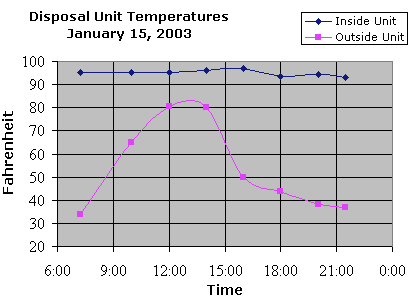
Black soldier flies in winter
 Although it's tough to get a
black soldier fly bin started during cold weather, some folks theorize
that you can keep summer-started bins operating all winter. Since
the larvae produce a lot of heat as they consume your food waste, a
piece of styrofoam placed on top of the compostables may keep the
larvae above the 70 degrees Fahrenheit they need in order to stay
active.
Although it's tough to get a
black soldier fly bin started during cold weather, some folks theorize
that you can keep summer-started bins operating all winter. Since
the larvae produce a lot of heat as they consume your food waste, a
piece of styrofoam placed on top of the compostables may keep the
larvae above the 70 degrees Fahrenheit they need in order to stay
active.
While winterizing a
black soldier fly bin sounded intriguing at first, the more I
researched it, the more I felt that I should probably just plan on
using the larvae during the summer months. An exhaustive search
of the internet turns up lots of folks who theorize about winterizing
their black soldier fly bins, but no one north of Florida who actually
kept their larvae active year-round. The problem is that if your
larvae stay active, they'll crawl out of the bin and pupate pretty
quickly, which leaves your bin empty of larvae since the adults won't
be laying fresh eggs in the winter.
On the other hand, if
you have the freezer space, you can toss extra summer pupae into your
larder for winter chicken treats. And since cold weather seems to
put the insects into a semi-hibernatory state, I wonder if you could
store a bucket of live pupae in a root cellar. Have you tried any
methods of extending your black soldier fly season into the winter
months?
| This post is part of our Black Soldier Fly lunchtime series.
Read all of the entries: |
Want more in-depth information? Browse through our books.
Or explore more posts by date or by subject.
About us: Anna Hess and Mark Hamilton spent over a decade living self-sufficiently in the mountains of Virginia before moving north to start over from scratch in the foothills of Ohio. They've experimented with permaculture, no-till gardening, trailersteading, home-based microbusinesses and much more, writing about their adventures in both blogs and books.
Want to be notified when new comments are posted on this page? Click on the RSS button after you add a comment to subscribe to the comment feed, or simply check the box beside "email replies to me" while writing your comment.

I know this thread is old, but I wanted to share my experience with soldier fly larvae. I live in the Pacific Nortwest, and this past winter, we have had mostly 30-mid-40s at night, and one week of very hard cold (22 degrees some night, not above freezing during the day).
I have a large wooden vermiculture bin, the size of a typical chest, that sits outdoors all year. I have seen its contents literally freeze solid on the outside and I don't know how far in that ice-cube went. Still, in the middle of the bin, surrounded by worms, sits a ball of soldier fly larva the size of very large cantelope. For two winters, this blob of larvae have overwintered just great, to the delight of my two ducks and one aquatic turtle.
I live in MD and just found out about these guys because I got a bearded dragon for my son and he eats a lot of these guys each day. So I started doing some research into how to raise my own. I can't say that I've ever noticed any around my area (Southern Maryland) and am contemplating throwing some larvae in a bin and see if they mature to start a wild population while there is still some bit of summer left.
Anyway, regarding wintering them, if it's a small enough colony (not feeding chickens or anything here), what about moving one of the small homemade bins indoors and place inside a screened in frame so the adults can fly around, mate, and procreate and still be contained within the home? Couldn't heat lamps or heat pads be used to help warm the bins since the inside temp of most people's homes are fairly ideal for the breeding side of things?